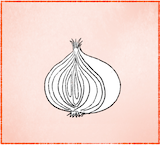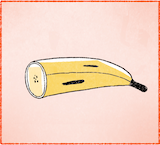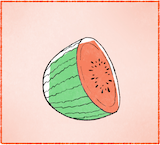


อันนี้คืออี่หยัง อันนี้กะเป็นหัวหอมเนาะ มีหัวหนึ่ง ถืกผ่าเคิ่งไปแล้วซ้ำแมะ
แล้วอีกเคิ่งหนึ่งหนะ มันไปใส อันนี้กะจักคือกัน กะบ่ฮู้เนาะ เห็นเคิ่งเดียว อีกเคิ่งหนึ่งเขาอาดสิเอาไปเฮ็ดแนวกินแล้ว หลือว่าเอาไปปุงแนวกินแล้วเนาะ กะเห็นเคิ่งเดียว ถืกผ่า ถืก เอาเหลียไว้หั้น เอาจ่งไว้หั้นเนาะ
7
อันนี้คืออี่หยัง อันนี้กะเป็นก้วยเนาะ เป็นก้วยน่วยหนึ่ง ถืกผ่าเคิ่งไปแล้วซ้ำแมะ เหลียอยู่เคิ่งเดียว
แล้วอีกเคิ่งหนึ่งมันไปใส กะจักคือกัน เขาอาดสิกินเคิ่งหนึ่ง แต่ว่าเขาใซ้มีดปาดเคิ่ง แล้วเคิ่งหนึ่งนั้นกิน แล้วกะเหลียเคิ่งหนึ่งไว้ หลือว่าจ่งเคิ่งหนึ่งไว้ เอาไว้ถ้ากินทีหลังกะได้เนาะ
8
อันนี้คืออี่หยัง อันนี้เป็นบักแตง หลือว่าแตงโมเนาะ เอิ้นง่ายๆ กะบักแตงนั้นหละเนาะ
เห็นเคิ่งเดียว เห็นเคิ่งน่วยเนาะ อีกเคิ่งหนึ่งจักมันไปใส เหลียเคิ่งเดียว จ่งไว้เคิ่งเดียว เคิ่งน่วยข้อหล้อเนาะ
Link to overview page
Link to dictionary
| Isaan | Pronunciation | Tones | Thai | English/Notes |
|---|---|---|---|---|
| อัน | an | M | อัน | 1. thing, object 2. general clf. for objects |
| นี้ | ni: | HF | นี้ | 1. this 2. here |
| คือ | khʉ: | HR | คือ | 1. to be, to resemble, like, as 2. why {บักหล้าคือบ่เก็บโต่ะแน่ = [addressing a young boy] Why haven't you cleared the table?} |
| อี่หยัง | i:-yaŋ | H-M | อะไร | 1. what {นี้คืออี่หยัง = What is this?} {มื้อนี้เจ้าเฮ็ดอี่หยัง = What are you doing today?} {กินเข้างายกับอี่หยัง = What did you have for breakfast?} 2. something, anything, (in negations) nothing {บ่ต้องเฮ็ดอี่หยังอีกเลยนอกจากใส่ปุย = [we] don't need to do anything besides adding fertilizer} |
| กะ | ga | M | ก็ | 1. then, consequently 2. also |
| เป็น | pen | M | เป็น | 1. to be, to exist 2. to be able to 3. to suffer, sth. happens to 4. เป็นหญัง[...]คือ in initial position: why? {เป็นหญังเขากะคือแปงฟัน = Why is he brushing his teeth?} {เป็นหญังเคี่ยงบินมันคือสิตก = Why is the airplane falling down?} |
| หัวหอม | hu:a-hɔ:m | M-M | หัวหอม | onion |
| เนาะ | nɔ | H | เนาะ | final particle: makes the statement softer, looking for agreement |
| มี | mi: | HR | มี | 1. to have 2. there is |
| หัว | hu:a | M | หัว | 1. head 2. clf. for onions, bulbs of garlic |
| หนึ่ง | nʉŋ | H | หนึ่ง | 1. one 2. after adjective: intensifier {บักคักหนึ่ง = very much} {อันบักใหญ่หนึ่ง = very large}, or attenuates the meaning {กะดาดมันแผ่นน้อยๆ หนึ่ง = the piece of paper is [relatively] small} |
| ถืก | thʉ:k | LF | ถูก | marker for passive {ขั้นมันถืกความฮ้อนมันกะละลาย = when it is exposed to heat, it melts} {เฮ็ดในสิ่งที่บ่ดี เขากะเลยต้องถืกจับ = [he's] done something bad, so he gets arrested} {กะดาดมันกำลังถืกไฟไหม้ = the paper is burning} |
| ผ่า | pha: | H | ผ่า | 1. to flash (lightning) {ฟ้าผ่ามันผ่ามันสิเสียงดังคัก = when a flash of lightning flashes, it's very loud} 2. to cut lengthwise, to cut open {เขาผ่าแตงโมน่วยนี้ไป่ = Has he cut this watermelon yet?} {เขากำลังผ่าบักพ้าว = she's cutting the coconut open} 3. to cross through, to go across |
| เคิ่ง | khəŋ | H | ครึ่ง | half {เวลาห้าโมงเคิ่ง = half past five} {เขาบีบบักนาวเคิ่งน่วย = he's pressing half a lime fruit} |
| ไป | pai | M | ไป | 1. to go 2. auxiliary indicating action extending into the future |
| แล้ว | lɛ:o | HF | แล้ว | 1. finished 2. already 3. and then, and next (especially แล้วกะ) 4. auxiliary for past tense |
| ซ้ำแมะ | sam-mɛ | HF-H | (ด้วย)แหละ | final particle used for emphasis Notes: also pronounced ซ้ำแม |
| อีก | i:k | LF | อีก | 1. more, again 2. other, another |
| หนะ | na | M | final particle | |
| มัน | man | HR | มัน | it (also used to refer to people) |
| ใส | sai | M | (ที่)ไหน | 1. where? {สิไปใส = Where are [you] going?} {มาแต่ใส = Where are [you] coming from?} {กะทะอยู่ใส = Where's the pan?} 2. somewhere, anywhere {ใสกะได้ = anywhere, wherever you like} |
| จัก | jak | M | จัก | 1. answer to a question: [I] don't know, don't know exactly, [I'm] not sure {พุซายคนนี้เขาเถ้าไป่ จัก จักเถ้าหลือบ่เถ้า เบิ่งบ่ค่อยออก = Is this man here already old? I don't know. I can't see clearly whether he's old or not.} {เขาเว้ากันอยู่ใส จักคือกัน = Where are they talking? I don't know either.} 2. exact(ly), what exactly {จักต้มอี่หยังกะบ่ฮู้ = I don't know what (exactly) he is cooking} {บ่ลู้คือกันจักปาอี่หยัง = I don't know either what kind of fish this is} 3. how much/many? {ต้นไม้มีจักต้น = How many trees are there?} {ตอนนี้จักโมงแล้ว = What time is it now?} {มือของเฮานี้สิมีจักนิ้ว = How many fingers do our hands have?} 4. a bit, a little bit {จักหน่อย/จักหน่อยหนึ่ง = a bit, a little bit} |
| คือกัน | khʉ:-gan | HR-M | เหมือนกัน | 1. also, likewise, similarly {ยินดีที่ได้ฮู้จักคือกันคับ = Nice to meet you too!} 2. in negative sentences: either {บ่ลู้คือกัน = I don't know either} {จักคือกัน = I don't know (either)} |
| บ่ | bɔ: | H | ไม่ | 1. no, not 2. question particle, transforming a statement into a question Notes: spelling exception in line with common usage on social media |
| ฮู้ | hu: | HF | รู้ | 1. to know 2. to understand Notes: equivalent to ลู้ |
| เห็น | hen | M | เห็น | to see |
| เดียว | di:ao | M | เดียว | only, alone, single |
| เขา | khao | M | เขา | personal pronoun: he, she |
| อาด | a:t | LF | อาจ | 1. might, may, will 2. likely |
| สิ | si | M | จะ | future tense auxiliary {เขากำลังสิตื่น = he's about to wake up} {สิไปตะหลาด = [I'm] going to the market} |
| เอา | ao | M | เอา | to take, to give {เขากำลังเอาก่องไปซั่ง = he's taking the boxes to weigh them} {หมอกำลังเอายาให้คนป่วยกิน = the doctor is giving medicine to the patient} {เอาไว้ถ้า = is for, is used for, has the purpose of} |
| เฮ็ด | het | H | ทำ | to do, to make |
| แนวกิน | nɛ:o-gin | HR-M | อาหาร | food {เฮ็ดแนวกิน = to prepare food} {ตำบักหุ่งเนี้ยกะสิเป็นแนวกิน = papaya salad is (a kind of) food} |
| หลือ | lʉ: | M | หรือ | or |
| ว่า | wa: | H | ว่า | 1. that, as {คำว่า X = the word X} 2. to say |
| ปุง | puŋ | M | ปรุง | to season, to flavor, to cook, to mix, to combine {ปุงกาแฟ = to season coffee, i.e., to add sugar} {ปุงกวยเตียว = to season noodle soup (e.g., with chili, fish sauce, vinegar, sugar etc.)} |
| เหลีย | li:a | M | เหลือ | to remain |
| ไว้ | wai | HF | ไว้ | 1. to keep, to put, to place, to retain, to save, to reserve {เขาเอาหัวของเขาไว้ใส = Where does she put her head?} {หมาสิเลี้ยงไว้บ้าน = dogs are kept/raised in the house} {ไก่เลี้ยงไว้ในคอก = chicken are kept/raised in a coop} {หน้ามันบังไว้ = the face is covered/not visible} {เขาเอาโทละสับวางไว้หู = he holds the phone to his ear} 2. for {นาลิกาปุกมีไว้เฮ็ดหญัง = What is an alarm clock for?} {หม้อเอาไว้เฮ็ดแนวกิน = a pot is used to make food} {ก่องเอาไว้เฮ็ดหญัง ก่องเอาไว้ใส่ของ = What is the box for? It's for putting in stuff.} Notes: see also ไว้ถ้า |
| หั้น | han | LF | ที่นั่น | there, over there |
| จ่ง | joŋ | H | เก็บไว้, เหลือไว้ | to keep, to leave |
| ก้วย | gu:ai | HF | กล้วย | banana |
| น่วย | nu:ai | H | ลูก, ผล | clf. for the fruits (e.g., banana, coconut, lime, papaya, watermelon), vegetables (e.g., chilis), eggs, mountains, the sun |
| อยู่ | yu: | H | อยู่ | 1. to be (located) at 2. yet, still 3. auxiliary indicating continuous or progressive action {ทอดปาอยู่ในกะทะ = (in the process of) frying a fish in the pan} {แม่กำลังเมี้ยนเฮียนอยู่ = mother is cleaning/tidying up the house} |
| กิน | gin | M | กิน | to eat, to consume, to use |
| แต่ว่า | tɛ:-wa: | H-H | แต่ว่า | 1. but 2. only {ฮู้แต่ว่าเขายืนอยู่พุเดียว = I only know that he's standing there by himself} |
| ใซ้ | sai | HF | ใช้ | to use |
| มีด | mi:t | HF | มีด | knife |
| ปาด | pa:t | LF | หั่น, ผ่า | to cut, to slice |
| นั้น | nan | HF | นั้น | that, there |
| ไว้ถ้า | wai-tha: | HF-LF | usually in a positive statement or answer: is for, is used for, has the purpose of {กะทะมีไว้ถ้าทอด = a pan is for frying} {น้ำบักนาวมีไว้ถ้าปุงอาหาน = lime juice is used to season food} {ปากกามีไว้ถ้าเขียน = a pen is for writing} {กะเทียมเอาไว้ถ้าเฮ็ดแนวกิน = garlic is used to make food} {ขาเอาไว้ถ้าญ่าง = legs are for walking} {เกิบเอาไว้ถ้าใส่ = shoes are for wearing} Notes: see also ไว้ |
|
| ทีหลัง | thi:-laŋ | HR-M | ทีหลัง | after, later |
| ได้ | dai | HF | ได้ | 1. can 2. to get, to obtain 3. before verb: indicating past tense 4. บ่ได้ + verb: not |
| บักแตง | bak-tɛ:ŋ | M-M | แตง | melon |
| แตงโม | tɛ:ŋ-mo: | M-HR | แตงโม | watermelon |
| เอิ้น | ə:n | HF | พูด, เรียก | to call, to say {เอิ้นง่ายๆ ว่า = in other words} {คนอี่สานเอิ้นว่า เป็นลูกคนกก = Isaan people call her ลูกคนกก} |
| ง่าย | ŋa:i | H | ง่าย | easy, simple, clear |
| นั้นหละ | nan-la | HF-M | นั่นแหละ | auxiliary for emphasis at the end of a phrase |
| ข้อหล้อ | khɔ:-lɔ: | LF-LF | เท่านั้น, ขนาดนั้น, น้อยๆ | only {ต้นไม้มีต้นเดียว ต้นเดียวข้อหล้อ = there's one tree, only one tree} {มีบ้านหลังเดียวข้อหล้อ = there's only one house} |